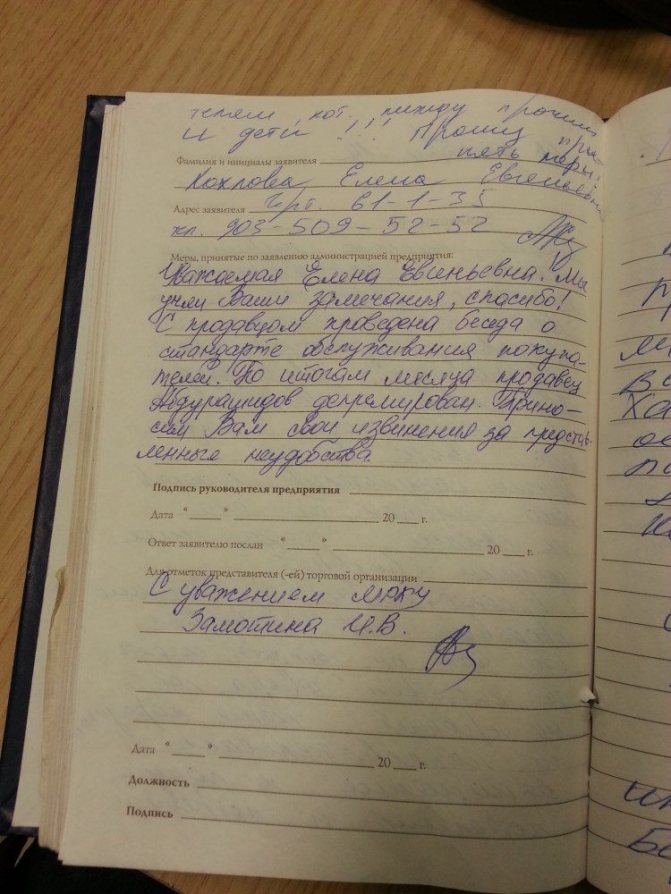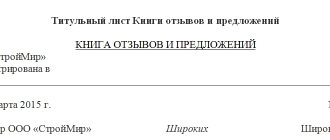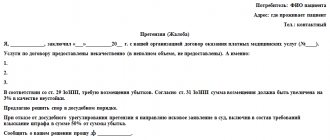Home / Complaints, courts, consumer rights
Back
Published: September 27, 2018
Reading time: 4 min
0
435
By law, every retail outlet must have a guest book. However, its presence should not be limited. If customer records appear in this information source, a response to them should follow as quickly as possible. How exactly should this happen?
- Who exactly should respond to customers in the guest book?
- What wording is best to avoid when writing a response to a complaint?
- Is it possible to limit myself to a phone call to the client?
- Principles for writing a response to a customer review
- Reaction to a justified complaint
- Reaction to an unfounded claim
- Reaction to gratitude
Who should be responsible?
The guest book should be reviewed regularly by company management. But in cases with chain stores, the boss himself will not be physically able to control all the complaint books, so it is permissible for the response to be drawn up by directors, senior managers, and direct supervisors of the point.
Important! For example, if the head of the company himself cannot respond, then the head of the sector, manager, store director, etc. can do it for him. The main rule is that you cannot respond to a complaint about yourself.
The answer must be given by an employee who holds a higher position. If a complaint is made against the store director, then only the head of the organization can respond. If the seller received the claim, then the manager above him can independently make an entry in the book.
How to react?
After the manager sees the complaint, he is obliged to respond to it. If the complaint is not justified or gratitude is expressed, then the response should be immediate. In cases of gratitude, you need to thank the consumer for the review and express your joy that the consumer liked the services provided.
After which, you can report this by calling or writing by email. This is why you need to leave your contacts when making an entry. In the case of an unfounded claim, the response must also be immediate. In the text you need to thank the client and write why his review cannot be considered.
In addition to writing in the book itself, the dissatisfied person can be notified by phone or email. The main condition is that the consumer must leave his data when writing a review . Otherwise, the company will have no way to contact the client.
Usually they notify you by telephone about reactions to a justified complaint. Since there are clearly established deadlines for reviewing the record, notification by phone is necessary. But if the victim did not leave a number, then the company will not be at fault.
Email is a less formal way to notify the consumer. Typically used to duplicate telephone answering. It is also often used to signal a response to gratitude.
Attention! If the complaint is justified, a telephone notification is required. Otherwise, the client can contact Rospotrebnadzor with a complaint. In this case, the company will be carefully checked.
Sometimes, customers leave their postal address instead of a phone number and email. A response to the postal address is possible, but only at the discretion of the company management. Typically this notification method is not used.
Only if the complaint is serious, justified and has serious grounds for consideration (including in court), the response will be sent to the postal address (unless the consumer has left other data). In other cases, management may not notify by mail.
So the answer should be:
- In the book itself.
- Dubbed over the phone.
- Sent by email.
- In difficult situations, notification by mail is possible.
Read more about what to do if a comment appears here.
Sample response to a complaint. Deadline for consideration of citizens' complaints
Types of complaints
Written appeals must be considered no later than fifteen days, and appeals requiring additional study and verification - no later than one month, unless a different period is established by legislative acts.
It is worth noting that, in comparison with the previously existing Law on Appeals of Citizens and Legal Entities, in this version there is no need to send a written notification to the citizen that the period for consideration of the appeal has been extended from 15 to 30 days. This notification must be sent only if the period of 30 days has been exceeded, if in order to resolve the issues from the appeal you need additional time (but not more than a month) to perform work or provide services.
What language should you avoid?
When composing the text, you must adhere to a business or journalistic style. You should not use slang words. Insults and rude language are unacceptable. Even if the buyer is frankly wrong, writes an unfounded review in a rude form, using swear words, the response to such a review should be friendly, brief and succinct.
For example, a person came to the store at 8:40 and the salesman was there, but according to the schedule the store is open from 9:00. The seller refuses to serve the client. The consumer writes an angry review about his bewilderment, because the seller was already at work.
The text should be something like this: “Thank you for your feedback, but such complaints will not be considered, since the store is open from 9:00. The seller is not obliged to serve customers outside of business hours.”
In addition to style, it is necessary to express your thoughts clearly and concisely. The text must clearly state the measures taken, or the grounds for which the claim will not be considered. The shorter and clearer the answer, the better.
Don't point out your mistakes to your clients. Even in cases with an unfounded complaint. It is best to briefly write why the employee was right in this situation. The formulation “the employee was right because...” is much better, more appropriate and clearer to the client than the formulation “you are wrong because...”.
Thus, when composing your answer, you should avoid:
- Too vague and long formulations.
- Slang, colloquial words.
- Indications of consumer errors.
We have a lot of materials about the book of reviews and suggestions, namely about registration and design, firmware, filling out the title page, and examples of good reviews. Also read about what to do if they don’t give you a book of complaints and suggestions in the store.
How to write a review in the “Book of Reviews and Suggestions”?
Of course, the client has the right to leave any entry in the book. But if he writes a complaint or review about the work of the organization in order to influence the quality of service and restore the violated rights of the consumer, then the complaint in the “Book of Complaints and Suggestions” must be formalized correctly. Only in this case will the claim have the proper effect. Are there specific requirements in accordance with which the “Book of Complaints and Suggestions” is filled out? How to file a complaint or review correctly?
For ease of completion, some organizations create a template on the first page in accordance with which you can leave a review. But if the “Book of Complaints and Suggestions” does not contain a sample form, then the complaint is written indicating the following information:
- Date (day, month, year) the complaint was written. It would also be useful to indicate the time of compilation.
- FULL NAME. and consumer contact information. This information should be indicated if you plan to receive a response from the administration to the complaint. If such a response is not mandatory, no one has the right to force the client to provide his data.
- FULL NAME. and the position of the employee whose actions gave rise to the complaint. This information is available on the employee’s name card (badge).
- A detailed description of the essence of the problem for which the complaint is being made. It is best if everything written is supported by reference to articles of law.
- If necessary, the client's requirements are stated, indicating the time frame within which measures must be taken.
- Signature and transcript of the signature of the originator of the complaint.
Is it possible to limit ourselves to just calling the consumer?
You can’t limit yourself to just one call. There must be an entry in the book itself.
Reference! If the consumer has left contact information: telephone and email, then informing him by telephone is mandatory only in the case of complaints. Thanks may remain without personal notification.
But the reaction to the entry in the book is mandatory. The rules are the same in cases of proposals.
Thus, you cannot limit yourself to just a call. First you need to make an entry in the book . If the complaint is justified, then you should definitely call. If it is unreasonable, a call is also required. If gratitude is expressed, you can limit yourself to only an entry in the guest book.
Response form
The form depends on the claim itself. If management sees a justified, serious complaint against one of the employees, then it is best to write a detailed text. This will let the client know that their complaint has been truly addressed, which in turn will have a positive effect on their mood. Also, a detailed answer will help to avoid additional questions.
In the case of an unfounded complaint, it is best to use the shortest possible response. But it must contain complete information about why the claim is not being considered. The main thing is to clearly express the reason for refusal of consideration.
In cases of gratitude, the choice remains with management. The main thing is to express gratitude in return to the client.
In addition to reviews, the book may contain suggestions. Answers to them should also be brief. But it is imperative to contain information about whether it is possible or not to implement the proposal and in what time frame.
By paying close attention to each entry in the book, you can achieve goodwill from most clients. The correct response to a complaint can radically change the customer's attitude.
Correct response to a complaint
You can't understand the true reasons for complaints until you get a complete picture of what is causing customer negativity. Ask more questions. This will allow you to understand the expectations of customers and those points where they diverged from reality. The ability to ask the right questions and hear the client's answers will help you get the right answers and effectively respond to negativity.
Asking your customers to provide feedback on a regular basis (even if they don't have any complaints) is also a great tool. The value of the information you can get from communicating with the buyer will be very high. Consider incorporating feedback into your business process. This practice will prevent complaints at the stage of their inception, or eliminate them altogether.
Of course, drafting responses to written complaints from customers cannot be called the most enjoyable experience. It is very important to know how to start and finish them correctly. But customer dissatisfaction in any case should not go unnoticed.
Most often, when a consumer complains, he wants the following:
- to be listened to and understood;
- to take comments seriously;
- to be treated with respect;
- so that certain measures are subsequently taken regarding the reasons for the complaints.
Therefore, when drawing up responses to customer complaints, it is necessary to focus on the emotional aspect, because, in fact, you need to fight not specifically with any employee, but in general with the problem of selling low-quality goods or improper customer service.
It is solving a specific problem, and not fighting with the customer, that will help maintain a warm relationship with him.
When working with a letter, it is recommended to adhere to the following:
- It is necessary to express gratitude to the client, and also explain for what reasons this was done, and apologize.
- Report what measures have been taken to eliminate the reason for which this or that complaint was written.
- Acknowledge the consumer's point of view.
- Personalize the response to the complaint to the client; in other words, when writing a response letter, formal replies should be avoided.
- You need to write simply, but at the same time correctly.
- Efforts must be made to exceed the client's expectations of promptness and appropriate action.
- It is recommended to find out the level of satisfaction of the consumer who wrote the complaint.
Dealing with incoming complaints is a clear indicator of how a manager knows how to work with his clients and how much he values them.
Complaints
Negative reviews are a reflection of the company's service quality. But without them, it is impossible to trace: is there any dynamics, how employees work, what gaps exist, etc.
Attention! Responses to negative reviews should be clear and concise. It is imperative to fully answer the questions: was the problem solved and what punishment followed.
When drafting, it is best to use simple wording. Also be sure to thank the client for his feedback.
For example, if the seller spoke rudely to the client, did not tell the main characteristics of the product (did not know or did not want to talk), then the client has the right to write a negative review (what can be written in the complaint book?). The answer to it should be something like this: “Thank you for your feedback, the seller had no right to talk to the client like that, and besides, he did not know the main characteristics of the product. For this he was fined 500 rubles. We hope this won’t happen again.”
Also, one of the psychological techniques is the use of the pronoun “You”. The more forms of the word “you” (your, yours, you) are used, the more trusting the client is in the review. Therefore, its too frequent use is acceptable in this case.
Next in the photo you can see an example of how to write a response to a complaint in the book of comments and suggestions.

Positive feedback
Managers can't help but be pleased by positive feedback . Usually only angry customers leave entries. And if a positive review appears, then the consumer must have been delighted with the service.
Such posts also need to be responded to. There are no special rules here. The manager should express gratitude in return and write that the company will try to work at the same level in the future. Also, if the employee received a bonus or gratitude, you need to indicate this in the response.
For example, thank you for leaving a review. Employee Ivanov was thanked and given a bonus of 500 rubles. We will try to work at the same level.
The answer is compiled in any form.
Below in the photo you can see an example of a response to a positive review.

Unfounded comment
The response to an unfounded complaint must contain information about why the complaint is not being considered. The client must understand where he was wrong. At the same time, it is not recommended to use the wording “you are wrong” or “your claim is not justified.”
Reference! The answer is compiled in any form.
For example, the client did not like the service. Text of the complaint: “The employee was rude to me.” Such a complaint is not justified, since it is not clear what exact words the employee used, when and how this happened. In this case, it is best to clarify the circumstances with the consumer. And the text of the response will be something like this: “Thank you for your feedback. To clarify the circumstances, please write more specifically about the problem. What conversation took place between you and the employee?
If the complaint is specific, but the client is clearly wrong, then the text of the response must be correct. For example, thank you for your feedback. The employee did not serve you from 13:00 to 13:30, since he was scheduled to have lunch at that time. Customers are not served during non-working hours.

Above you can see a photo of the response to an unfounded comment.
Sample response to a complaint. Deadline for consideration of citizens' complaints
Every customer is unique and communicates differently, which is why it is so difficult to properly respond to complaints. If the problem stems from misunderstanding, then it is worth trying new forms of communication.
For example, if you are dealing with negativity through email, sometimes you should schedule a phone call to clearly clarify the situation in a live format. After the phone call, you can summarize the conversation by sending it via text to the client's email. This will give you an additional opportunity to ensure that you both have the same understanding of the claims.
A complaint is one of the forms of protecting the rights of citizens. Almost every person has come across this term to one degree or another.
I just want to remember the catchphrase: “I will complain, I will find justice for you!” Many, of course, do not take such exclamations seriously, but in vain.
In the article we will explain this concept in detail and provide an example of a response to a complaint in order to prevent the development of a conflict. After all, this is in the interests of both entrepreneurs and clients. But first things first.
Types of complaints
The sample response to a complaint depends on the specific type of paper mentioned. Let's list the main ones:
- Legal complaints. These are appeal, cassation, private decisions or actions of the court. Thus, this concept is close to the meaning of “statement of claim”. Regulated by the Civil Procedure Code of the Russian Federation.
- Complaints to government bodies about the actions or inactions of officials, organizations, and enterprises. For example, to the state inspectorate for violation of labor rights, the prosecutor's office, etc. A synonym for the word “statement.” Both of these concepts in this case are legally equivalent. They are, as a rule, regulated by the Code of Administrative Procedure of the Russian Federation and the Administrative Code of the Russian Federation.
- Complaints about commercial enterprises, stores, etc. Can be in the form of a personal statement, or also written in a book of reviews and suggestions. In Soviet times it was called the “book of complaints.” In this meaning, it is synonymous with the concept of “claim”. It is regulated by the Civil Code of the Russian Federation. Below we will tell you more about the claims.
According to the Law “On Protection of Consumer Rights”, every establishment must have a book of reviews and suggestions. A response to the complaint is required. At the request of the client, the establishment is obliged to provide it.
Some citizens often abuse their rights and try to assert themselves at the expense of the establishment’s staff. They usually write negative reviews for any reason, and sometimes without it.
Let's assume the situation. A woman walked into an Internet cafe. She asks the administrator to help send a letter, find information, and continue down the list for half an hour. The employee has to come out from behind the cash register and help the lady.
As a result, “instead of thanking you,” she takes the book of reviews and “writes” a whole page of negative information. She was “rude, rude, poorly served,” etc. A week later, the woman comes again to check if her entry has disappeared, and again leaves a half-page negative review.
The employees are perplexed, and so is the owner. What the inspection staff of Rospotrebnadzor will say{q}
There's really nothing to be afraid of. But you still need to react. A sample response to a complaint will look something like this: “The substance of the complaint was reviewed by the administration.
A conversation was held with employees. It is recommended to be more attentive to the wishes of clients. Full name, position, signature, number.”
Any complaint, regardless of the degree of “guilt” of employees, must be examined in detail.
The reason is not the legislative obligation provided for by the Civil Code of the Russian Federation. Staff must know that any feedback has consequences. This measure will allow you to “increase” responsibility for actions to clients, mobilize staff, teach you how to work with objections, etc.
Who writes complaints{q}
An appeal is understood as an individual or collective statement, proposal, complaint, expressed in written, electronic or oral form. Please note that this list of application forms is exhaustive, that is, written requests sent by fax, SMS, MMS or other methods that the consumer’s imagination suggests are not written requests, and, accordingly, are not subject to registration and consideration with the provision of a written response .
- A written appeal can be submitted by a citizen to the Book of Comments and Suggestions.
- An electronic appeal is an applicant’s appeal received at the organization’s email address or posted in a special section on the organization’s official website on the Internet.
- An oral appeal is considered to be the applicant’s appeal presented during a personal reception. It should be noted that a citizen’s appeal, for example, to an organization’s contact center or a verbal remark made to a salesperson at the counter will not be considered oral. In this case, the applicant should not expect a mandatory response to the spoken words in writing.
Appeals are presented in Belarusian or Russian. A written response to a citizen’s written request must be issued in the language in which the citizen addresses you in writing. This requirement does not apply to communication with a citizen during consultations, service, product demonstration, etc.
Written appeals from citizens must contain:
- name and (or) address of the organization or position of the person to whom the appeal is sent;
- surname, first name, patronymic (if any) or initials of the citizen, address of his place of residence (place of stay);
- statement of the essence of the appeal;
- personal signature of the citizen (citizens).
If you follow the letter of the law verbatim, then applications that do not fall within the specified requirements will not be considered, but more on that below. That is, if a citizen did not indicate his last name at all, writing only his first name, or wrote his last name, but did not indicate his first name or even initials, the appeal is not subject to consideration.
The text of the appeal must be readable. Handwritten requests must be written in clear, legible handwriting. The use of obscene or offensive words or expressions in messages is not allowed.
We invite you to read: Ideas for a girl’s personal diary
This means that if you were unable to decipher what was written due to unreadable handwriting, then you will also not be able to provide an answer, which is not your fault. In the event of a complaint from such a citizen to a higher organization, you will need to provide this appeal with an explanation that it is not readable.
Appeals submitted in the manner established by this Law are subject to mandatory acceptance and registration. Refusal to accept applications is not allowed.
Any appeal submitted by the three methods indicated above must be registered. Even if it is written on a napkin, notebook sheet or piece of whatman paper. But this does not mean that there must be a response to a registered request. You will deal with this a little later, when you start working on the fact of the appeal.
According to this article of the Law, while you are dealing with the solution to the situation regarding the received appeal within the established time frame (more on that below) and have not yet given a written response, all subsequent appeals from a citizen on this topic can be taken into account as one appeal. This is very helpful in cases of consumer extremism, when a citizen writes you one letter every day, hoping to starve you out.
The procedure for conducting paperwork on applications from citizens and legal entities is established by the Council of Ministers of the Republic of Belarus. Processing of requests is carried out separately from all other correspondence received at your address. You must have a journal or electronic form for registering received requests, which will contain serial numbers with established indexes, a brief description of the request and a decision on it.
Almost every website has a feedback form with the seller, and a variety of online communication options are offered. This includes an online consultant, email, all kinds of chats, and support groups. Can all letters and requests of this kind be considered electronic requests, which, by the way, should be subject to consideration in the manner established for the consideration of written requests{q}
The law informs us about the responsibilities of only government bodies and organizations, on whose website information about the method or methods of submitting electronic appeals to this government body or other government organization should be posted.
Electronic requests received by non-state organizations are not considered unless a different procedure for handling such requests is determined by the head of the organization (superior organization).
If you, as a business owner, believe that correspondence on the Internet with a consumer is of an informational nature for you, then this kind of request from subscribers cannot be considered an official electronic request, which, like a written one, must be registered with a time limit for providing a response.
If you nevertheless decide to get yourself an official email and consider letters of any content that fall there to be electronic, then let me remind you that the same work standards apply to such letters as for written requests, with the only difference being that responses are sent electronically .
So it goes.
Interesting{q} Share with friends!
How to notify the client?
If a complaint is written in the book (whether justified or not), then the answer must be repeated over the phone. If the client indicated an email, then it can be duplicated via the Internet, but this is not mandatory. Notification by email is required only if the consumer has not provided any other information.
- If the book contains a thank you note or a suggestion, then notification is not necessary.
- If the client has indicated a postal address, then the notification remains at the discretion of the organization.
- To avoid controversial situations, it is best to notify the consumer through all possible channels.
The main thing is that the client leaves contact information when filing a claim.
Responses to complaints must be succinct, concise and understandable. Don't point out consumer mistakes. It is best to express the answer in a friendly manner.









